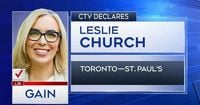On Monday night, April 28, 2025, the political landscape in Toronto shifted as the closely watched ridings of Toronto-St. Paul’s and Eglinton-Lawrence delivered significant results. In a closely contested race, Liberal candidate Leslie Church emerged victorious, defeating Conservative incumbent Don Stewart, while in Eglinton-Lawrence, Liberal Vince Gasparro maintained a slight lead over Conservative Karen Stintz.
Leslie Church, a prominent figure in the Liberal Party and a top aide to former finance minister Chrystia Freeland, was determined to reclaim the Toronto-St. Paul’s riding for her party. With a campaign focused on climate action, inclusion, and community strength, Church’s victory marks a notable shift in a riding that has been a Conservative stronghold. “I’m committed to fighting for the issues that matter—climate action, inclusion, and keeping our community strong,” she posted on her X account just a day prior to the election.
Church, who has represented Canada at significant international forums such as the G7 and the White House, emphasized her platform aimed at strengthening the economy and creating higher-paying jobs. Her win is seen as a reflection of changing voter sentiments in the area, as she successfully connected with constituents eager for change.
In contrast, Don Stewart, who has called St. Paul’s home since 2016 and has a background in engineering and business, had hoped to maintain his seat. Stewart, who previously sold construction products before entering politics, had been advocating for what he described as “common sense leadership” to be restored in Ottawa. “This is our chance to put common sense leadership back to Ottawa and choose a government that puts Canada First,” he wrote on his X account on election eve.
Meanwhile, in Eglinton-Lawrence, the race was equally competitive. Liberal candidate Vince Gasparro, who previously came within 200 votes of winning the seat during the provincial election, was slightly ahead of Karen Stintz, a former city councillor who served from 2003 until 2014. Stintz, who is currently the president and CEO of Variety Village and Variety the Children’s Charity – Ontario, has deep roots in the community and a strong following, making the race particularly intense.
“We built something bigger than a campaign. We built a movement. Now it’s time to finish what we started. This is our moment, Eglinton-Lawrence,” Stintz proclaimed on her X account, rallying supporters as the polls closed.
Gasparro, reflecting the urgency of the election, tweeted on the morning of April 28, “This is the most consequential election of our lifetime.” His campaign focused on revitalizing the area and addressing the concerns of constituents who have felt overlooked in recent years. Born and raised in North York to Italian-Canadian parents, Gasparro has a strong connection to the community and hopes to leverage his experience in finance and government to bring about positive change.
The results of these races highlight a broader trend in Canadian politics, particularly in urban areas where traditional voting patterns are being challenged. The Liberal Party’s success in reclaiming Toronto-St. Paul’s reflects a growing desire among voters for progressive policies and leadership that prioritizes community and environmental issues.
Leslie Church’s victory was celebrated not only as a personal achievement but also as a signal of the shifting political tide in the region. Speaking to CBC’s Eli Glasner after her win, Church articulated her vision for the future, emphasizing the importance of unity in addressing pressing challenges. “This victory is not just about me; it’s about what we can achieve together,” she stated, underscoring the collaborative spirit she hopes to foster in her new role.
As the dust settles from the election, both winning candidates face the challenge of delivering on their promises and addressing the needs of their constituents. With the political landscape evolving, the focus will be on how these new representatives will navigate the complexities of governance in a city that is increasingly diverse and dynamic.
The implications of these results extend beyond the immediate electoral outcomes. They signal a potential shift in the broader political narrative in Canada, where urban ridings are becoming battlegrounds for competing ideologies. As the Liberal Party seeks to solidify its foothold in Toronto, the Conservative Party will need to reassess its strategies to regain lost ground.
Looking ahead, both Church and Gasparro will be tasked with not only representing their constituents but also addressing the larger issues facing the city, including housing affordability, climate change, and economic recovery post-pandemic. The stakes are high, and the expectations from voters are even higher.
As the new parliamentary session unfolds, the focus will be on how these elected officials will collaborate across party lines to tackle the pressing issues that impact the lives of Torontonians and Canadians at large. The recent elections in Toronto-St. Paul’s and Eglinton-Lawrence may very well be a bellwether for the future of Canadian politics, and all eyes will be on these new representatives as they begin their terms in office.

